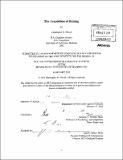The acquisition of raising
Author(s)
Hirsch, Christopher K
DownloadFull printable version (30.63Mb)
Other Contributors
Massachusetts Institute of Technology. Dept. of Brain and Cognitive Sciences.
Advisor
Kenneth N. Wexler.
Terms of use
Metadata
Show full item recordAbstract
This work serves as the first comprehensive investigation into typically developing children's acquisition of subject-to-subject (StS) raising. In particular, it asks how English-speaking children come to comprehend a StS raised sentence like (1) versus its semantically equivalent unraised counterpart (2), and how the presence of an experiencer-phrase affects interpretation (3): (1) John[subscript i] seems [t[subscript i] to be dancing]. (2) It seems that John is dancing. (3) John[subscript i] seems to Mary [t[subscript i] to be dancing]. The acquisition of StS raising is of particular bearing given renewed interest in the acquisition of verbal passives, which share syntactic traits with StS raising and which have been argued to develop late under genetic guidance. Using sentence-picture matching and truth-value judgment experiments, the following comprehension results obtain: e Unraised sentences are acquired early, with most three-year-old children demonstrating mastery. - Sentences involving StS raising over an experiencer (ROE) are delayed until around age seven, with many children incorrectly interpreting them as involving raising-to-object (RtO) syntax. e Sentences involving StS raising with no experiencer (RNE) are likewise delayed until around age seven, with many children incorrectly interpreting them as involving either subject control or copular syntax. - Subject control sentences are acquired early, by at least age three. - The delayed acquisition of StS raising (ROE and RNE) appears to be developmentally linked with the delayed acquisition of verbal passives. The noted delay in comprehension of StS raising occurs despite the fact that StS raising sentences are found to be relatively common in child-directed speech. These data serve to rule out several grammatical acquisition accounts in the literature that have attempted to capture children's delayed comprehension of verbal passives (e.g. External Argument Requirement Hypothesis, Canonical Alignment Hypothesis, and Universal Freezing Hypothesis). The data, however, are both compatible with and predicted by the Universal Phase Requirement (UPR; Wexler, 2004), a grammatical account on which children are claimed to take all vPs to define strong phases for maturational reasons. Only UPR correctly predicts delay for StS raising (with and without an experiencer-phrase) in early child grammar, and a positive correlation with the acquisition of verbal passives.
Description
Thesis (Ph. D.)--Massachusetts Institute of Technology, Dept. of Brain and Cognitive Sciences, 2011. Cataloged from PDF version of thesis. Includes bibliographical references (p. 399-407).
Date issued
2011Department
Massachusetts Institute of Technology. Department of Brain and Cognitive SciencesPublisher
Massachusetts Institute of Technology
Keywords
Brain and Cognitive Sciences.